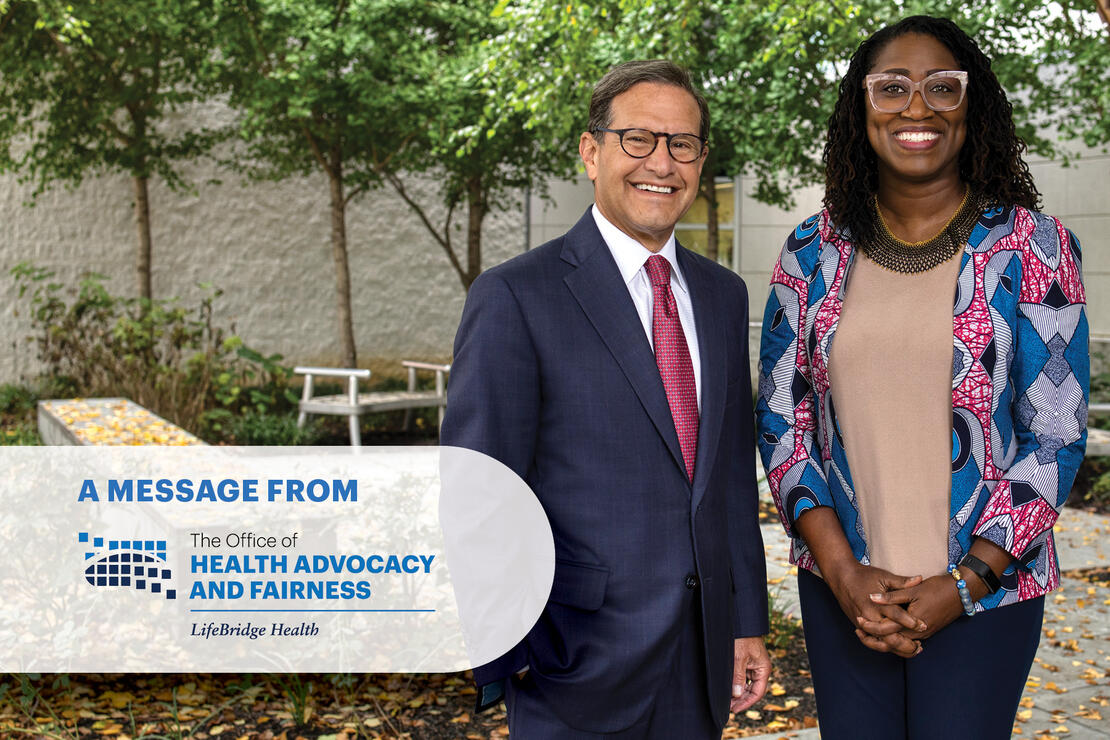A Message From the Office of Health Advocacy and Fairness - August 2025

The Office of Health Advocacy and Fairness continues in our resolve to make LifeBridge Health a place where all our team members are safe, our patients receive high-quality care and our community’s needs are met. This happens because of our amazing team members, who show up every day and serve our community selflessly in our ambulatory offices, surgery centers, The Family Tree, Bridging Life, Center for Hope, LifeBridge Health & Fitness, urgent care centers, hospitals and all the places where we provide care.
This month, we recognize the various observances that reflect the diverse backgrounds, beliefs and experiences of our team members, the individuals in our care and our communities.
Honor Black-owned businesses in the United States in the month of August
Every August, we celebrate National Black Business Month, an annual observance that began nearly 20 years ago by two San Francisco-based Black business executives to highlight the remarkable achievements and contributions of Black-owned businesses across the United States.
National Eye Exam Month
August is National Eye Exam Month. There is a lot you can do to help keep your eyes healthy and protect your vision in between your yearly exams!
Summer Sun Safety Month
Summer Sun Safety Month is observed in August as a reminder to keep yourself safe and healthy in the sun during the summer. Sunlight is essential for your body to produce Vitamin D, however, too much of it can cause harmful effects to your skin and eyes.
Lughnasadh (8/01)
August 1 is Lughnasadh, a harvest celebration of Gaelic origin and one of the eight sabbats in the Neopagan Wheel of the Year. Lughnasadh is an official holiday in Ireland, marked by various fairs and festivals, and is observed by modern Wiccans and Neopagans. We send our best wishes to all who celebrate for a joyful start to the harvest season.
Tisha B’av (8/2-8/3)
Tisha B’Av is an annual fast day in Judaism, on which several disasters in Jewish history occurred, primarily the destruction of both Solomon’s Temple by the Neo-Babylonian Empire and the Second Temple by the Roman Empire in Jerusalem.
International Day of the World’s Indigenous Peoples (8/09)
International Day of the World’s Indigenous Peoples is observed annually on August 9 in honor of indigenous peoples across the globe. Indigenous peoples are those who are ancestrally native to the areas they inhabit. This day is a celebration of native cultures all over the world with the aim of education and awareness.
Qixi (8/22)
The Qixi (Double Seven) Festival is celebrated on the seventh day of the seventh Chinese lunar month, falling this year on August 22. Also known as Chinese Valentine’s Day, the holiday originates from a Chinese legend about a humble cowherder who fell in love with a fairy from heaven. As the story goes, the fairy’s mother was a goddess who separated the lovers with a river of stars, creating the Milky Way. However, the lovers were still able to use a bridge of magpies to meet once a year. Qixi is the romantic Chinese holiday and is still celebrated with exchanges of gifts, such as flowers or chocolate, between lovers.
Women's Equality Day (8/26)
In the United States, Women’s Equality Day is observed on the anniversary of the Nineteenth Amendment, which ensured women’s right to vote, being signed into law on August 26, 1920. Women’s Equality Day serves to remind us of the hard-fought social advancements women in the United States have achieved, as well as the many remaining obstacles that must be addressed in working towards a more equitable society for people of all genders.
Calls to Action
- Reflect. Think about how access to wellness and self-care resources differs for everyone. What role can you play in making self-care more inclusive and equitable for all?
- Recognize. Acknowledge that wellness looks different for everyone. Recognize the cultural, emotional and physical challenges some groups face—and celebrate those who are making self-care a priority despite these obstacles.
- Respond. Support a culture where everyone—patients, coworkers and community members—feels empowered to care for themselves. Share accessible, culturally sensitive wellness resources and encourage others to take time for their health.